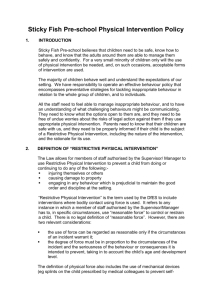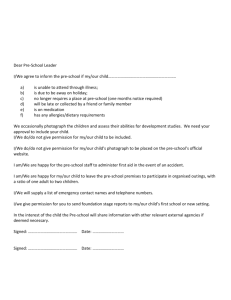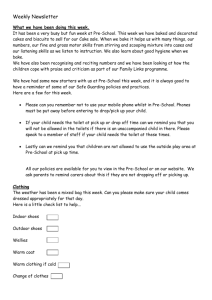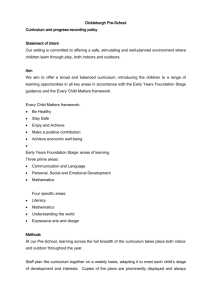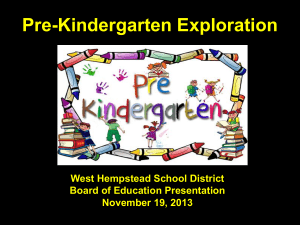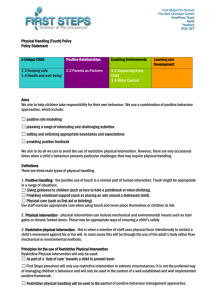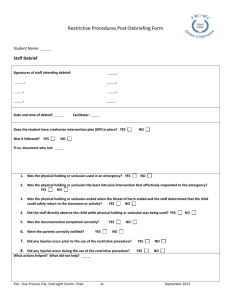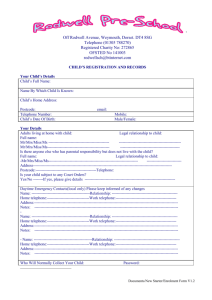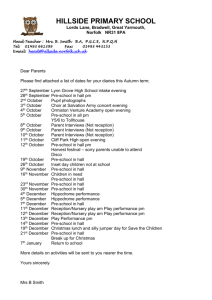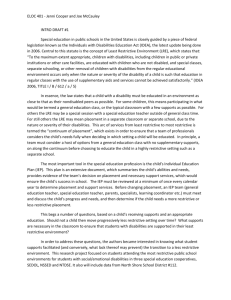Dickleburgh Pre-School Positive Handling and Touch Policy
advertisement
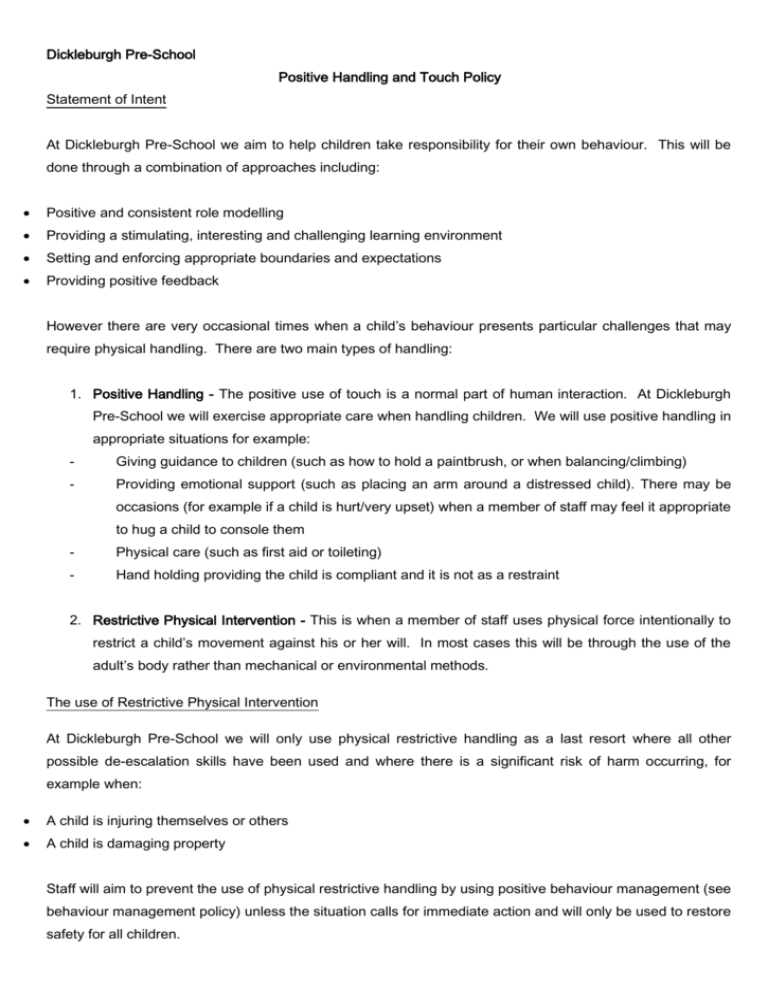
Dickleburgh Pre-School Positive Handling and Touch Policy Statement of Intent At Dickleburgh Pre-School we aim to help children take responsibility for their own behaviour. This will be done through a combination of approaches including: Positive and consistent role modelling Providing a stimulating, interesting and challenging learning environment Setting and enforcing appropriate boundaries and expectations Providing positive feedback However there are very occasional times when a child’s behaviour presents particular challenges that may require physical handling. There are two main types of handling: 1. Positive Handling - The positive use of touch is a normal part of human interaction. At Dickleburgh Pre-School we will exercise appropriate care when handling children. We will use positive handling in appropriate situations for example: - Giving guidance to children (such as how to hold a paintbrush, or when balancing/climbing) - Providing emotional support (such as placing an arm around a distressed child). There may be occasions (for example if a child is hurt/very upset) when a member of staff may feel it appropriate to hug a child to console them - Physical care (such as first aid or toileting) - Hand holding providing the child is compliant and it is not as a restraint 2. Restrictive Physical Intervention - This is when a member of staff uses physical force intentionally to restrict a child’s movement against his or her will. In most cases this will be through the use of the adult’s body rather than mechanical or environmental methods. The use of Restrictive Physical Intervention At Dickleburgh Pre-School we will only use physical restrictive handling as a last resort where all other possible de-escalation skills have been used and where there is a significant risk of harm occurring, for example when: A child is injuring themselves or others A child is damaging property Staff will aim to prevent the use of physical restrictive handling by using positive behaviour management (see behaviour management policy) unless the situation calls for immediate action and will only be used to restore safety for all children. Within our duty of care, staff may use physical restrictive handling if a child is trying to leave the setting and would be at risk of harm. This policy extends beyond the setting boundaries when staff have charge of children off site. Physical Restrictive Handling will never be used out of anger or as a punishment, and will always be necessary, reasonable and proportionate. Method A member of staff who knows the child best, typically their key person or back-up key person will be involved in keeping the child safe. All other methods of behaviour management will be considered/used before any physical intervention is used. This would include a range of approaches such as humour, distraction, relocation and offering choices. We have plans in place to reduce the need for physical intervention which include completing risk reduction plans where required for individual children, following a de-escalation script to help a child by talking and listening to them, and completing record of harm documents to monitor any harm caused and to put strategies in place to meet individual needs. Where an individual child’s behaviour means that they are likely to require physical restrictive handling, we will discuss this with the parents and set out a physical handling plan. This plan would specify the staff member(s) most appropriate and other methods to be used to support the child and maintain their physical and emotional health. Other professionals appropriate to the child may be consulted in the making of the plan. These plans will be reviewed at least half termly and more often if there are major changes in the child’s behaviours. Staff have had specific training (Step on) in the use of Physical Restrictive Intervention. Where it is judged necessary, staff will: Aim for side by side contact between adult and child to reduce the risk of being injured Aim for no gap between the adult and child body to reduce the risk of impact and damage Aim to avoid holding the child at joints to avoid pain and damage Aim to avoid lifting the child Aim to not restrict the child’s ability to breathe At no time will a child be forced to spend time alone in a locked room. After Physical Restrictive Intervention the situation will be reviewed and a handling plan will be made. Recording and reporting The Pre-School Leader/Deputy will inform the parents as soon as possible – usually telephoning. The Leader/Deputy and staff member(s) involved will record and report the incident within 24 hours. The parents will be given a copy of the report. The Incident may also be noted in other records such as accident/incident records. It is distressing to be involved in a Restrictive Physical Intervention, whether as the adult doing the holding, the child being held or observers. Support will be given to the child so they understand why they were held. This conversation will happen when all are calm enough to talk productively and the child can understand. A record will be kept about how the child felt about this. Staff may have similar conversations with children who observed the incident. Parents of these children will be informed. Support will be given to the staff involved, both directly or as observers. The staff will have an opportunity to share what happened with other staff members. We aim that the after-incident support will repair any potential strain to the relationship between the child and adult. Staff will review the individual behaviour plan so that the risk of needing to use Restrictive Physical Intervention again is reduced. Monitoring We will only monitor the use of Restrictive Physical Intervention to help identify trends, therefore to develop our ability to meet the needs of children without the use of Restrictive Physical Intervention. TOUCH POLICY Touch is essential in order to provide sensitive and good quality care for the children and young people we support. Used in context, and with empathy, touch supports the development of our natural interactions with the children and young people we care for. In play or for emotional reasons children of any age who are at early levels of development are likely to be quite tactile and physical. We may choose to hold children for a variety of reasons, but in general terms we would normally do so for either comfort or reward. We may also need to physically touch, guide or prompt children if they require personal care, assistance with writing, eating, dressing, walking alongside busy roads etc. How do we use touch? 1. HUGGING – At Pre-School, we encourage staff that are using touch for comfort or reward to use a ‘Pre-School hug’. This is a sideways on hug, with the adult putting their hands on the child’s shoulders. This discourages ‘front on’ hugging, and the adult’s hands on the shoulders limits the ability of the child to turn themselves onto you. This can be done either standing or sitting. 2. HAND HOLDING – We recognise that children sometimes enjoy being able to hold hands with adults around them. This is perfectly acceptable when the hand holding is compliant. At Dickleburgh Pre-School we would encourage all children to be independent however, we would take the hand of a child to give reassurance and to communicate security and comfort if this was deemed appropriate for the emotional well being or safety of the child concerned. 3. LAP SITTING – At our Pre-School we actively discourage lap-sitting. Children are encouraged to seek comfort/attention through other means, for example the Pre-School hug. If a child attempts to sit on your lap, we would explain to them that this is not what we do here, and ask them to sit next to a member of staff or peer if this is appropriate. At times, children in such crisis or distress decide to hold in such a way which is not described as above (e.g. ‘front on’ hug/lap sitting). If this should happen we would give the child guidance as to the more appropriate methods of touch listed above. The use of touch is discussed openly and regularly between staff. Gender and cultural factors have relevance in issues of touch. The emotional and communication needs of the individual will be discussed with all concerned and due equal consideration. Please note that although we have a touch policy and believe that contingent touch can be a positive experience for the children that we care for, this does not mean that we have to touch children and we realise that some children will not want to be touched and we respect this. In compliance with the revised Early Years Foundation Stage (Sept 21012), if we are the main childcare provider for the child we will carry out a two year progress check when the child is between 24 and 36 months. This will be a short written summary of the child’s development in the three prime areas of the EYFS - personal, social and emotional development, communication and language and physical development. This will enable us to inform and support a child’s development. Staff will liaise with parents who will be fully involved in the process. This policy was adopted at a meeting of Dickleburgh Pre-School. Held on (date) Signed on behalf of the Management Committee Role of signatory (eg. Chairperson)
